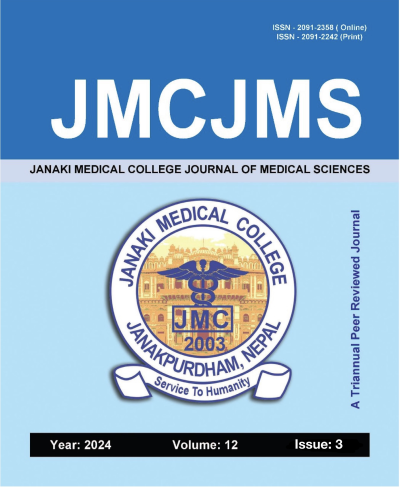Effect of moderate intensity exercise on cardiovascular autonomic function in obese female adults of Western Nepal
DOI:
https://doi.org/10.3126/jmcjms.v12i03.73966Keywords:
anthropometric variables, blood pressure, cold pressor test, exercise, obesityAbstract
Background & Objectives: Obesity is a known risk factor for metabolic disorders such as high blood pressure, body fat abnormality, and glucose intolerance. In addition, obesity has been associated with dysregulation of autonomic function in humans, which may influence the morbidity and mortality of cardiovascular (CV) diseases. Being physically active has been proven to be a protective measure against CV diseases. Thus, this study aimed to determine the effect of moderate-intensity aerobic exercise on CV modulation among obese females in the mid-western region of Nepal.
Materials and Methods: We screened 28 healthy subjects to study the correlation between exercise and CV reactivity (Autonomic Nervous System (ANS) modulated) in obese subjects. Anthropometric and autonomic function parameters were measured before and after the intervention of four months of aerobic exercise and analysed.
Results: The result showed a strong correlation of exercise with Resting Heart Rate (RHR) (p= 0.02), baseline systolic blood pressure (SBP) (p= 0.01), and diastolic blood pressure (DBP) (p =0.03 ). It also showed a significant correlation between exercise and CV reactivity change in SBP (p = 0.01) during the cold pressor test (CPT). However, some variables like change in DBP during CPT did not have a significant correlation (p= 0.94 ) with exercise.
Conclusion: As obesity-related morbidity and mortality are burgeoning in our society, it is imperative to focus on exercise training to prevent and reverse CV neuropathy. Relevant aerobic exercise intervention can serve as an excellent countermeasure for the prevention of CV disease (CVD) by CV autonomic modulation.
Downloads
Downloads
Published
How to Cite
Issue
Section
License
© JMCJMS, JMC, Janakpur, Nepal




